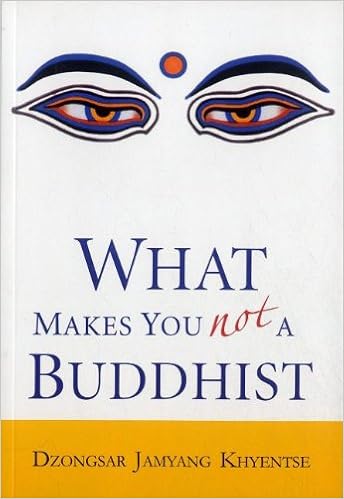
Few days back I saw my colleague reading a book with
all his interest. He was drowned within the wisdom of the book that he even
didn’t see me coming to him. I jolted him and asked that I have never seen him
taking that seriousness in reading. He looked at me and at the book
simultaneously and then said, “What makes you not Buddhist?” without any second
thought I answered him, but my answer was not in relation to what he had known.
He just glanced at the book and showed me the title of the book and said that
when I finished reading, he will give it to me to let me know the answer of the
question he has asked.
As vowed, he gave me the book suggesting that I need
to read not for the sake of reading. I
took his words and said nothing. When I looked at the title of the book it
reminded me the question he has asked me “What makes you not Buddhist?” because
it is the title of the book. I rampage the page and said to him that I will
finish reading tonight.
Going through the book made me realize, how orthodox
and superstitious I was. Whatever I had been thinking till now is not less than
the false concept. I was deeply honoured by each and every words of the author.
It made me to understand why people feel hopeless ad exhausted after several
hard works and why some enjoy the life of affluence.
The book says that to be happy one needs to adhere
the four seals and has to implement in one’s life. Though one might find hard
to work with the following four seals:
1. All
compounded things are impermanent.
2. All
emotions are pain
3. All
things have no inherent Existence
4. Nirvana
is beyond concepts.
It also states that to be Buddhist it is not
necessary that one needs to abandon one’s family and build an austerity life. But
to be Buddhist one need to understanding the teaching of Buddha, follow the
path that suits us to venerate the birth of being human. The thought of
feelings must touch the aspect of being impermanent. Once we realize the
impermanence it is of sure that one will know how all the existence are assembled
and without the purpose of one it will
be hard to function others. For instance, when we consider ourselves as self
(I) we are being so concern and selfish as if we are not made out of assembled components. In case if one of the components is not in the state of function then to which we
shall address self or I.
Lastly, but not the least I urge all the viewers of
my blog to read the book “What makes you not Buddhist.” With keen interest and
see what it means to you.
0 comments:
Post a Comment